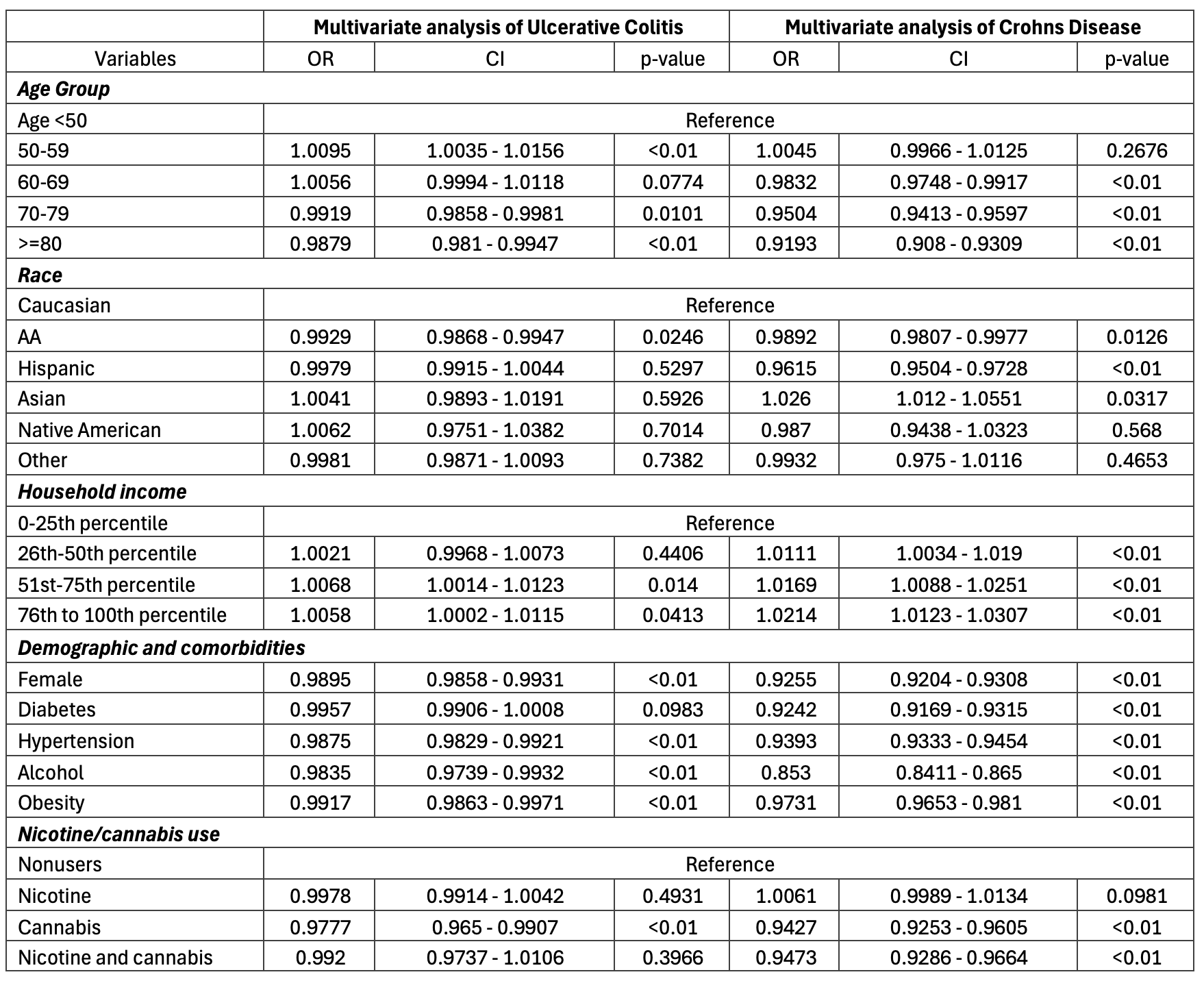Monday Poster Session
Category: IBD
P3283 - Comparative Effects of Cigarette and Cannabis Smoking on Inflammatory Bowel Disease Complications and Outcomes: A Nationwide Analysis
Monday, October 27, 2025
10:30 AM - 4:00 PM PDT
Location: Exhibit Hall

Carla Barberan Parraga, MD (she/her/hers)
Maimonides Medical Center
Brooklyn, NY
Presenting Author(s)
Carla Barberan Parraga, MD1, Samantha Ehrlich, MD1, Kundan Jana, MBBS1, Nicole Villa, MD2, Ahmed Salem, MD1, Ron Porat Jankelson, MD3
1Maimonides Medical Center, Brooklyn, NY; 2NYC Health + Hospitals/Metropolitan, New York, NY; 3Maimonides Medical Center, New York, NY
Introduction: The impact of cigarettes and cannabis use on patients with inflammatory bowel disease (IBD) remains unclear, with conflicting evidence. With the growing legalization of cannabis, its use among IBD patients has increased. However, the effects of cannabis on IBD are still debated. While some studies suggest it may improve symptom control and promote remission, others fail to show clear benefits. This study aims to provide more information regarding the relationship between cigarettes and cannabis smoking in IBD-related outcomes.
Methods: We analyzed patients aged 18 years or older with IBD or related complications from 2016 to 2021 using the National Inpatient Sample database and ICD-10 codes. Patients were grouped by nicotine and cannabis use. Survey-weighted methods accounted for stratified sampling. Survey statistical methods, accounting for strata and weighted data, were utilized for analysis. Categorical and continuous variables were compared using Roa-Scott chi-square and Student’s t-tests, respectively. Composite IBD complications were assessed via univariate and multivariate regression, including covariates with p< 0.1; significance was set at p< 0.05. Data were extracted with Python (v3.9.1) and analyzed in R (v3.6.2) using the survey package.
Results: A total of 189,796 patients were included: 155,466 nonsmokers, 28,295 nicotine smokers, 3,365 cannabis smokers, and 2,670 dual users. Complications assessed include pouchitis, toxic megacolon, abscess, obstruction, and others. In ulcerative colitis, cannabis users had lower odds of complications than nonsmokers and smokers (OR 0.97, P< 0.01). Cigarette smokers had shorter hospital stays than nonsmokers (LOS: 4.20±4.31 vs. 4.55±5.01, p< 0.01). In Crohn's disease, cannabis and dual users had fewer complications than smokers (OR 0.94, p< 0.01), but cannabis users had longer hospital stays than both nonsmokers and cigarette smokers (p< 0.01).
Discussion: These results raise questions about the true impact of smoking on IBD. Despite cannabis smoking showing lower odds of complications in IBD, the differences in LOS between CD and UC highlight the need for further investigation. As cannabis use increases post-legalization, understanding its combined effects with nicotine on IBD is crucial for evaluating disease progression and outcomes.

Figure: Table 1. Multivariate Analysis of Complications in patients with IBD and cannabis use.
Disclosures:
Carla Barberan Parraga indicated no relevant financial relationships.
Samantha Ehrlich indicated no relevant financial relationships.
Kundan Jana indicated no relevant financial relationships.
Nicole Villa indicated no relevant financial relationships.
Ahmed Salem indicated no relevant financial relationships.
Ron Porat Jankelson indicated no relevant financial relationships.
Carla Barberan Parraga, MD1, Samantha Ehrlich, MD1, Kundan Jana, MBBS1, Nicole Villa, MD2, Ahmed Salem, MD1, Ron Porat Jankelson, MD3. P3283 - Comparative Effects of Cigarette and Cannabis Smoking on Inflammatory Bowel Disease Complications and Outcomes: A Nationwide Analysis, ACG 2025 Annual Scientific Meeting Abstracts. Phoenix, AZ: American College of Gastroenterology.
1Maimonides Medical Center, Brooklyn, NY; 2NYC Health + Hospitals/Metropolitan, New York, NY; 3Maimonides Medical Center, New York, NY
Introduction: The impact of cigarettes and cannabis use on patients with inflammatory bowel disease (IBD) remains unclear, with conflicting evidence. With the growing legalization of cannabis, its use among IBD patients has increased. However, the effects of cannabis on IBD are still debated. While some studies suggest it may improve symptom control and promote remission, others fail to show clear benefits. This study aims to provide more information regarding the relationship between cigarettes and cannabis smoking in IBD-related outcomes.
Methods: We analyzed patients aged 18 years or older with IBD or related complications from 2016 to 2021 using the National Inpatient Sample database and ICD-10 codes. Patients were grouped by nicotine and cannabis use. Survey-weighted methods accounted for stratified sampling. Survey statistical methods, accounting for strata and weighted data, were utilized for analysis. Categorical and continuous variables were compared using Roa-Scott chi-square and Student’s t-tests, respectively. Composite IBD complications were assessed via univariate and multivariate regression, including covariates with p< 0.1; significance was set at p< 0.05. Data were extracted with Python (v3.9.1) and analyzed in R (v3.6.2) using the survey package.
Results: A total of 189,796 patients were included: 155,466 nonsmokers, 28,295 nicotine smokers, 3,365 cannabis smokers, and 2,670 dual users. Complications assessed include pouchitis, toxic megacolon, abscess, obstruction, and others. In ulcerative colitis, cannabis users had lower odds of complications than nonsmokers and smokers (OR 0.97, P< 0.01). Cigarette smokers had shorter hospital stays than nonsmokers (LOS: 4.20±4.31 vs. 4.55±5.01, p< 0.01). In Crohn's disease, cannabis and dual users had fewer complications than smokers (OR 0.94, p< 0.01), but cannabis users had longer hospital stays than both nonsmokers and cigarette smokers (p< 0.01).
Discussion: These results raise questions about the true impact of smoking on IBD. Despite cannabis smoking showing lower odds of complications in IBD, the differences in LOS between CD and UC highlight the need for further investigation. As cannabis use increases post-legalization, understanding its combined effects with nicotine on IBD is crucial for evaluating disease progression and outcomes.

Figure: Table 1. Multivariate Analysis of Complications in patients with IBD and cannabis use.
Disclosures:
Carla Barberan Parraga indicated no relevant financial relationships.
Samantha Ehrlich indicated no relevant financial relationships.
Kundan Jana indicated no relevant financial relationships.
Nicole Villa indicated no relevant financial relationships.
Ahmed Salem indicated no relevant financial relationships.
Ron Porat Jankelson indicated no relevant financial relationships.
Carla Barberan Parraga, MD1, Samantha Ehrlich, MD1, Kundan Jana, MBBS1, Nicole Villa, MD2, Ahmed Salem, MD1, Ron Porat Jankelson, MD3. P3283 - Comparative Effects of Cigarette and Cannabis Smoking on Inflammatory Bowel Disease Complications and Outcomes: A Nationwide Analysis, ACG 2025 Annual Scientific Meeting Abstracts. Phoenix, AZ: American College of Gastroenterology.
